When thousands of animals were left stranded and starving during the Kerala floods of 2018, RESQ Charitable Trust (Pune) assembled a team to help them. This is my account of our journey.
When disaster strikes, animals are often neglected, and this was disturbingly true in the case of the Kerala floods of 2018. As a veterinarian at RESQ Charitable Trust (an animal rescue NGO in Pune) and as someone whose family is from Kerala, I felt compelled to do anything and everything I could to help. But the question was -- how? How could I possibly help from so many miles away? Fortunately, fate held the answer to that.
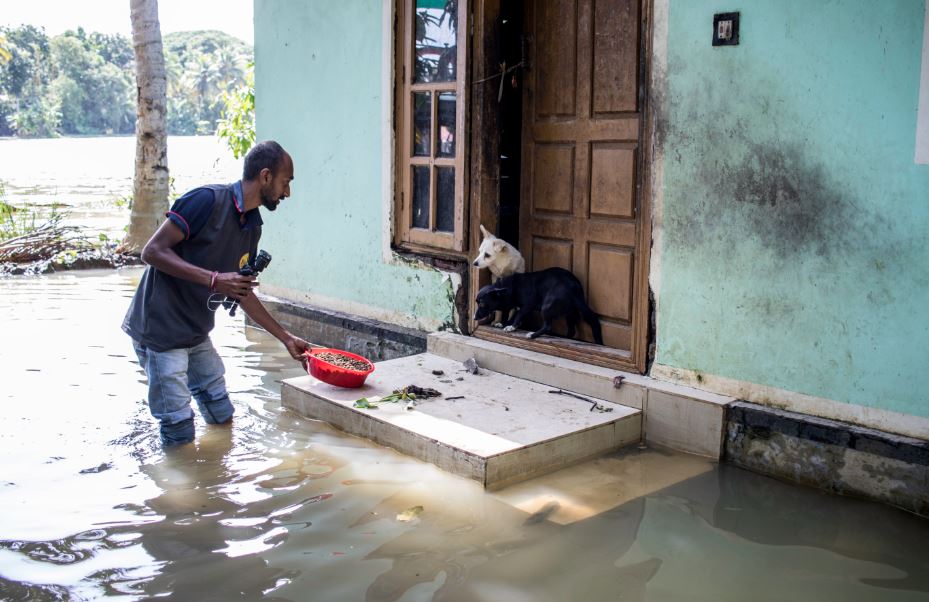
Rescuing pets who had been left behind by their owners...
When local animal rescuers in Kerala reached out to RESQ’s Founder, asking if she could send a Large Animal Ambulance to help rescue the thousands of farm animals left stranded due to the devastating floods in August 2018, she did them one better: within a matter of mere hours, she had mobilised a team of animal rescue personnel and equipment, and 3 rescue vehicles including one Large Animal Ambulance. I volunteered to join without hesitation.
As water levels continued to rise in Kerala, we were informed that several animals had been abandoned, tied to posts, and left behind to die. While animal rescuers on-ground were doing their best to save the lives of small pets such as dogs and cats, thousands of large animals were condemned to an undeserved death simply because they were too large to transport to safety, or that the region lacked experienced manpower to rescue them. My team’s collective opinion on the matter? A simple but determined: "Animals are animals regardless of where they are, and right now, the animals of Kerala need our help!"
Turns out, we weren't the only ones who felt this way. When we made the announcement on social media, the response was overwhelming to say the least. Dozens of supporters came forth within the span of 24 hours, sending much-needed items such as food, blankets, water, newspapers, and more. This, combined with the kind support of Help Animals India and Wildlife Trust of India, ensured that we were prepared for such a large-scale rescue operation. All that was left was for us to say goodbye to our loved ones, and embark on a ride that would leave us forever changed.
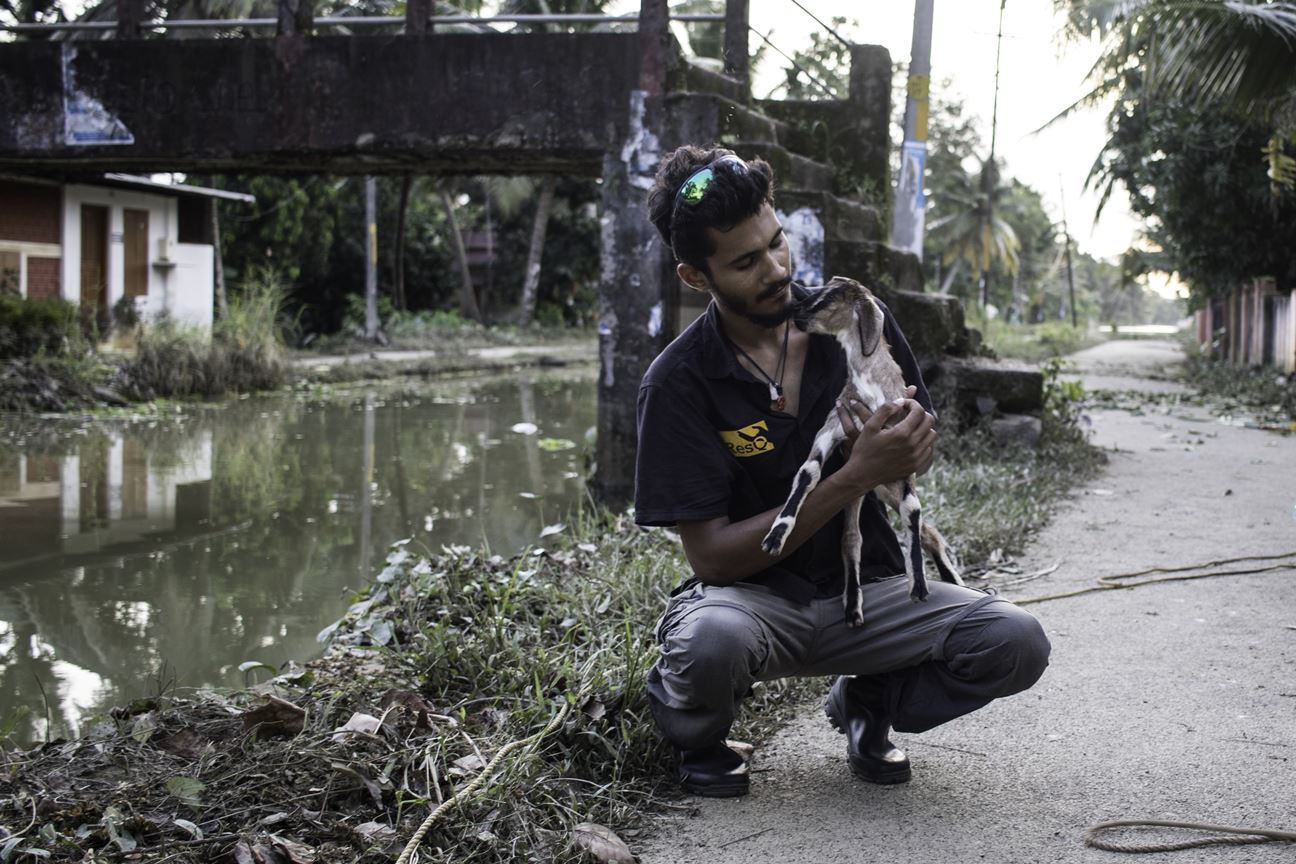
All animals deserve saving...
We left our homes in Pune at 7:00 am on the cold, crisp morning of August 20th, our minds still foggy and struggling to fully digest the fact that we were about to embark on a 30-hour trip, diving headfirst into a land that was being decimated by Nature’s wrath. We loaded 3 vehicles with medicines, clothes, food and rescue equipment, and set off for the flood-ravaged state of Kerala. It was a strange feeling, sitting in the van, waiting for torrid asphalt to morph into tempestuous waters. The decision to join the flood relief efforts was so sudden that we hadn’t had the time to fully process the implications of it yet. Nevertheless, we swallowed our fear, steeled our nerves, and focused on the only thing that mattered: we were going to help as many animals as we possibly could.
We drove for 12 hours straight, before finally stopping to rest for the night at Tumkur (Karnataka). Three of us hired a room, while three of us slept in the car to save what little money we had. Throughout the journey, we had no idea where we were going to stay, whom to contact should we lose our way, or if and when we could even eat a hot meal. We hadn’t even arrived at our destination yet and were already starting to feel the dull beginnings of fatigue.
We caught what little shut-eye we could and resumed our journey at 4:00 am the next morning. There weren’t any places we could stop to eat at, so we just drove on, spurred by a strange kind of exhausted determination. Realising that the rescue teams on-ground didn’t have extra life jackets, we made a brief stop in Coimbatore (Tamil Nadu) to pick up life jackets and head-lamps, before arriving in Thrissur to hand over 10 bags of dog food and 4 bags of cattle food to local animal welfare representatives. The people there were visibly weary, smiling their thanks to us despite their exhaustion.
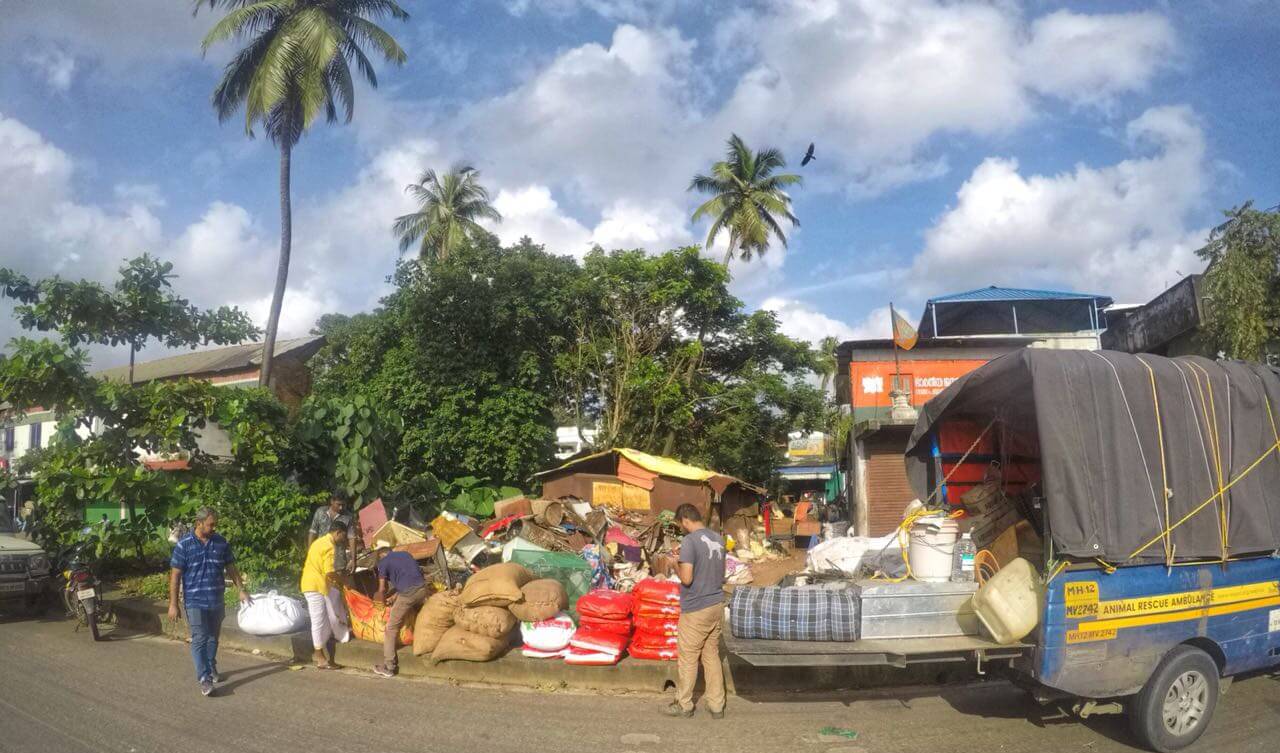
As we made our way towards Padamughal in Kochi, we noticed that the water was slowly receding in the main city areas, yet there were clear indications of just how bad it had been. Dark shadows of water stains slapped against the discoloured concrete of high walls. Shop windows had been shattered by the fury of the floods; supermarket items littered the streets outside. In spite of the devastation, however, we could see that people were trying to resume normal life in the main city areas.
Finally, we arrived at Padamughal, where we managed to set up our Base Camp. My family (who are from Kerala) arranged accommodation for us, my parents hurriedly dusting and tidying up a house that hadn’t been used in over 6 months, preparing for our arrival despite barely any notice. When we arrived, we set up our medicines in one room, instruments in another, and animal feed in the last room for systematic storage, which we knew would help us respond to emergencies efficiently. We shared our location with every animal rescuer and organisation that had been in touch with us thus far, so that they would know where to collect food and medicines from.
Before we settled down for the night, local coordinators sent us a list of animals that needed rescuing the next day, including 37 abandoned dogs. We studied this list carefully, phones held tight between calloused fingers, our veins throbbing with the inevitable surge of adrenaline: we had made it. We were finally in Kerala.
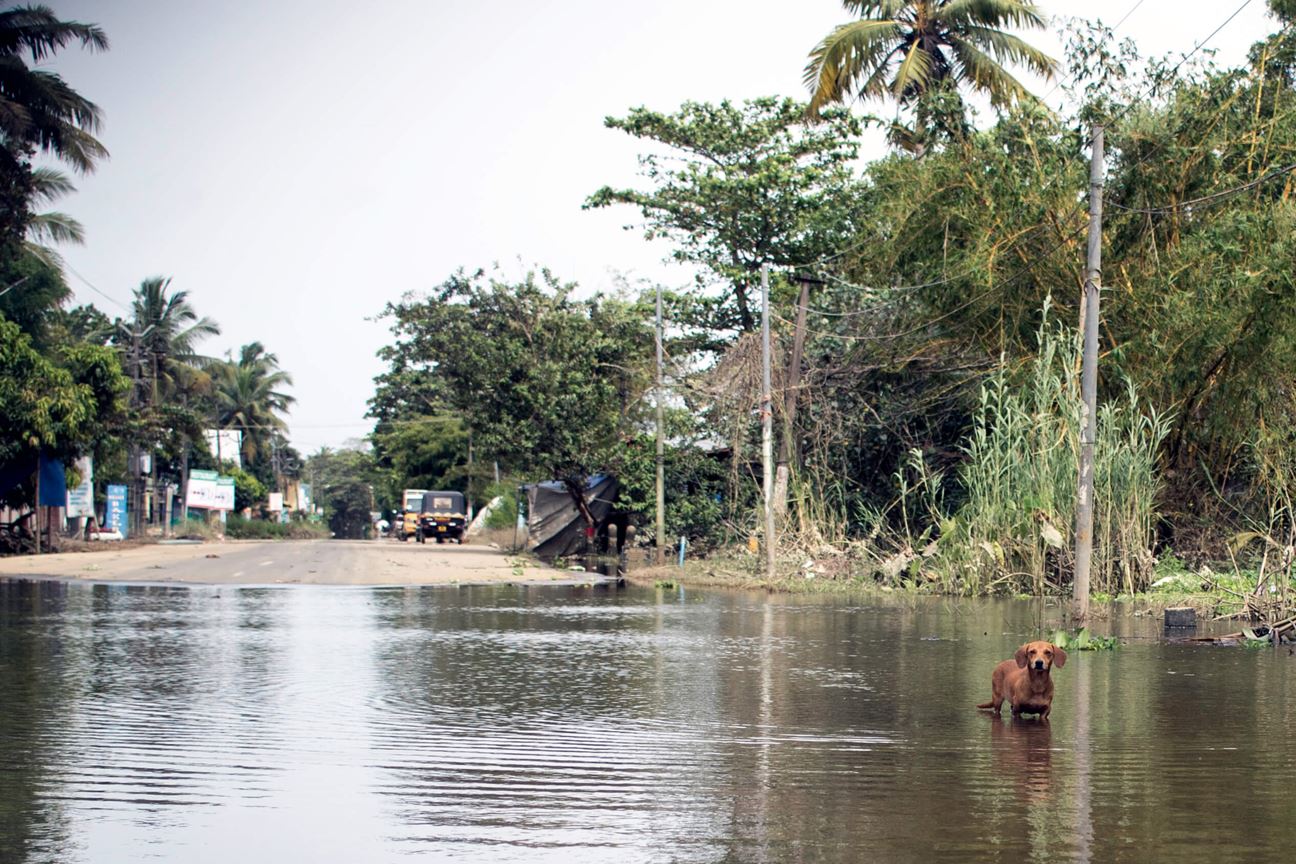
We rose at 5:00 am on the morning of August 22nd, and waited for local animal rescue groups to coordinate the day’s itinerary with us. While we waited, we made small emergency kits for them and sorted through rescue gear and equipment we could share. Finally, we left the RESQ Base Camp at 10:00 am and headed for Alappuzha, where the Animal Warriors team briefed us on the current situation in Kerala. While water may have receded in city areas, in places like Alappuzha, the floods were a palpable and continuing threat.
Members of Animal Warriors had arranged for boats at Alappuzha Boat Jetty, which would take us into the most flood-affected areas. We were assigned as Team C (Teams A and B comprised of local animal rescuers), and were told to search for abandoned animals and report back to Team A. The areas that had been assigned to us were Kainakary and Pullangudy. We got to work immediately, loaded our equipment and medicines onto the boats, and familiarised ourselves with walkie-talkies that had been provided by Wildlife Trust of India (WTI) for efficient coordination between each team. A local translator volunteered to join us and offered to show us around the area. As I was the only veterinarian out of the three teams, I provided Teams A and B with medical kits and briefed volunteers on the contents of each bag. Meanwhile, RESQ Charitable Trust’s Head of Rescues, Tuhin Satarkar, shared extra graspers and nets with each team.
As we set off at 11:00 am, one image that really hit me with the magnitude of the situation was that of a canal: the canal was so filled with water that it merged with the level of a high road. In fact, it was so difficult to distinguish between the canal and the road, that it quite frankly sent a chill down my spine. Even though we had life jackets on our backs, our boat was heavy with medicines and equipment, and the currents in the water were unforgiving and unpredictable: enough to topple the boat without a moment’s notice. It was nerve-wracking on the initial go.
As our boat waded through Alappuzha, I saw the bloated bodies of at least ten dead animals floating in the water. I steadied my hammering heart and focused on the job at hand. The journey was incredibly frustrating, as we had only been assigned to scouting as opposed to rescuing, the latter being something we specialised in and eagerly wanted to help with. The radius of our walkie-talkies was 2 kms, and our boat had to go at a distance of at least 4-5 kms away from Team A and Team B, so there was no way to communicate for most of the day. Needless to say, there was a lot of back-and-forth involved, which I felt wasted precious time and resources.
We had a full list of animals to check on as distressed owners had called the Animal Rescue Helpline (set up by local rescuers) to report their stranded pets. In addition to this list, we found three stranded pet dogs and reported them to Team A, who arranged food for them. We also found a breeder’s house, where 7 dogs had been tied to posts on higher ground. We reported the same to Team A, who took further action. Next, we headed towards our assigned stops at Pullangudy, where two members of our team (Tuhin and Rajdeep) offloaded along with our local translator and went looking for stranded animals, who were then reported to Team A.
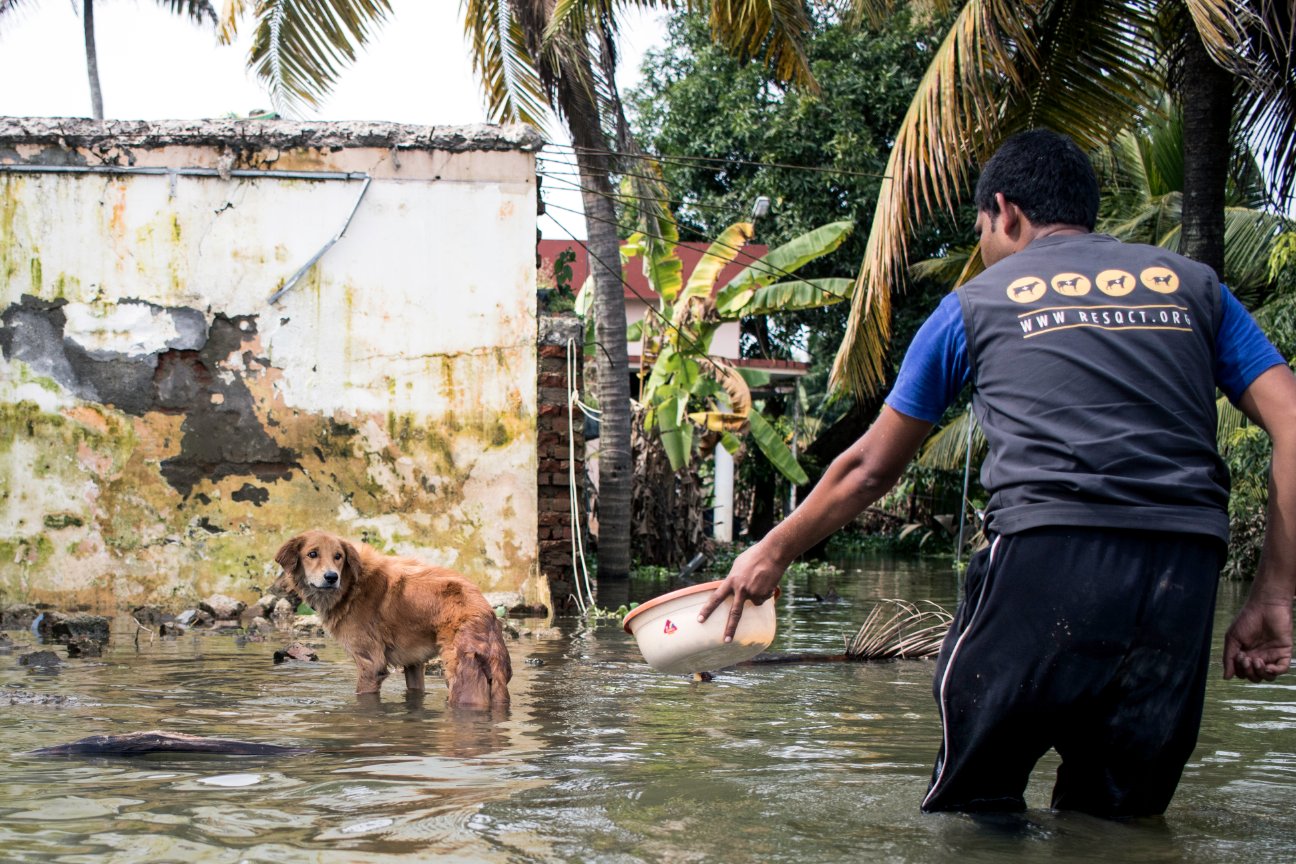
Raju offering food to a stranded dog.
Because we are used to actively working on emergency on-ground rescues, simply reporting and having to move on was frustrating work to say the least, especially since our boat was so heavy with useful equipment. We returned to Alappuzha Jetty by about 5-6pm and waited for the other teams. When Team B arrived, we saw that they had rescued three dogs (including an abandoned Labrador), two chickens, and three goats. I checked all animals for any ailments, and noted that the Labrador had a mild skin infection, while one of the goats showed signs of pain in his left forelimb. We administered the necessary medication, and waited for Team A to return to port.
Although Team B had rescued 8 animals, they hadn’t made any arrangements for shelter as they had assumed that the local Animal Husbandry Department would take the animals in. Unfortunately, they had no way to transport the animals. By now, it was 8:00 pm, and although we were exhausted and hungry, we offered to transport the animals without a moment’s hesitation as we were the only ones with a Large Animal Ambulance that could carry them. All we had to do was wait for Team A.
Team A docked into port at 9:00 pm with one juvenile Brahminy kite, and a Pomeranian dog that had cataract in his right eye and compromised vision in the left. The kite’s owners had had its flight feathers cut so that it wouldn’t fly away, as is the sad fate of most exotic birds in India. We loaded the animals onto our vehicles, and drove to the Animal Husbandry Department of the region. Sadly, we were denied admission due to the late hour. Tired and frustrated, we took the animals back to the port and waited, trying to work on a new plan to get these animals the help and shelter they needed. By way of pure coincidence, a family that had been looking after a human relief camp stopped by, asking us what we were doing. Sensing that we needed help, they offered to keep the animals at their bungalow for the night, and we set off for their home immediately, our clothes heavy and sodden with water but our hearts warmed by this gesture of kindness.
We arrived at the bungalow by around 12:30 am, and helped to make proper sleeping and resting arrangements for the animals in the covered verandah. We gave the family food and water for the animals, enough to last the night and extra for the morning, and bid them all goodbye, relieved that we had been able to help these animals after all, for we know that simply rescuing an animal isn’t enough: one must also grant them a life worth rescuing for.
As we headed back to RESQ Base Camp, we received an emergency call about an accident case. We rushed to the location and arrived at 1:00 am to find a paralysed (paraplegic) dog with sores on both feet. It was clear that the dog had been hit by a vehicle, and had likely sustained a spinal compression.
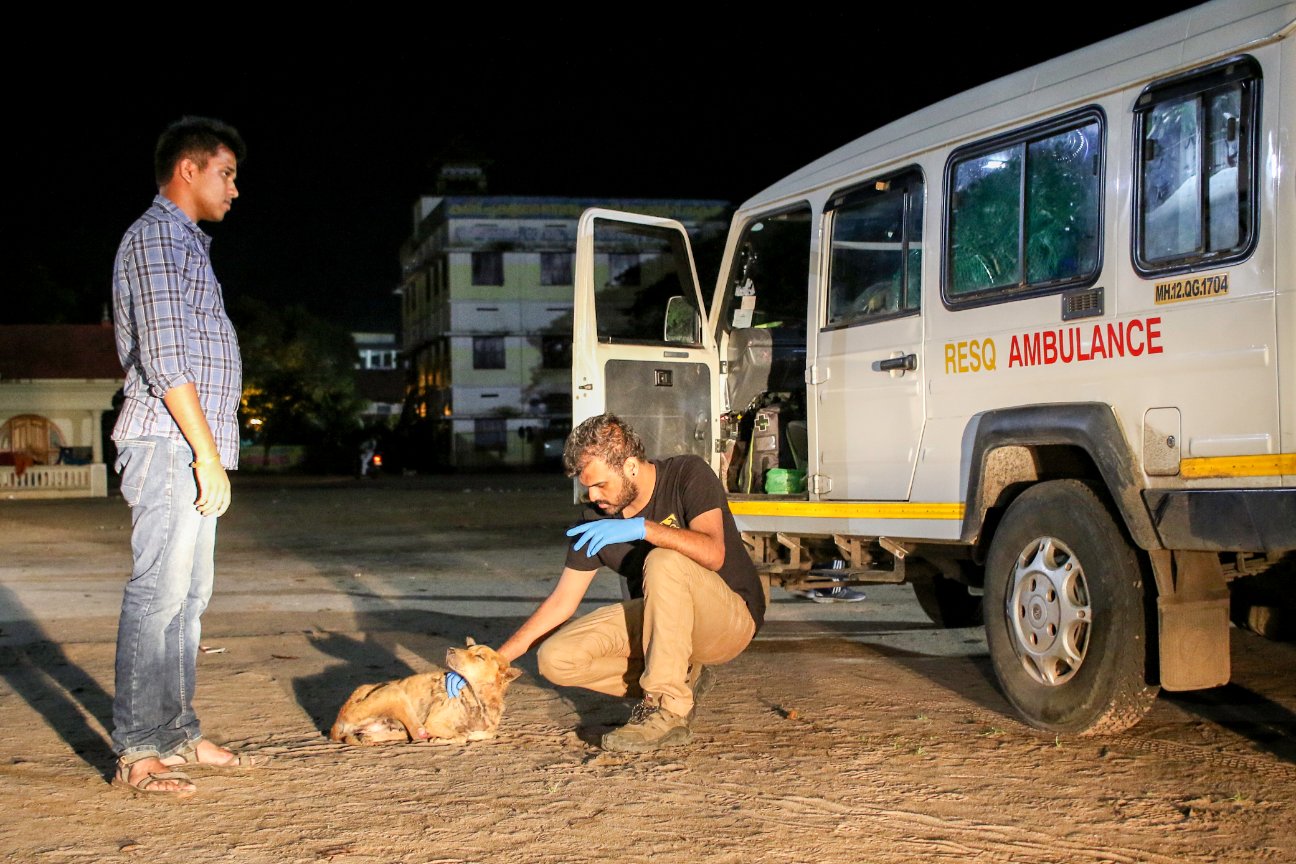 Emergency on-site aid for a paralysed dog.
Emergency on-site aid for a paralysed dog.
I administered emergency medical treatment on the spot, and as we knew there was a dog shelter near Base Camp, we dropped him off there after providing medical treatment. We also dropped off some dog food and medicines at the shelter, and finally reached Base Camp at 3:00 am. There was no food available, and we were too exhausted to eat, anyway. The last thing I heard that night was the sound of heads hitting pillows, before a bone-weary darkness took over.
It had only been three days since we first accepted and embarked on this mission, yet it already felt like we’d been on this journey for at least a week. Although the Animal Warriors comprised of a dedicated team of 10 volunteers, it was clear that they had far too much on their plate; that rescuers in the region were too few to cope with the number of animals that needed help, and that Kerala’s animals desperately needed more experienced manpower and resources.
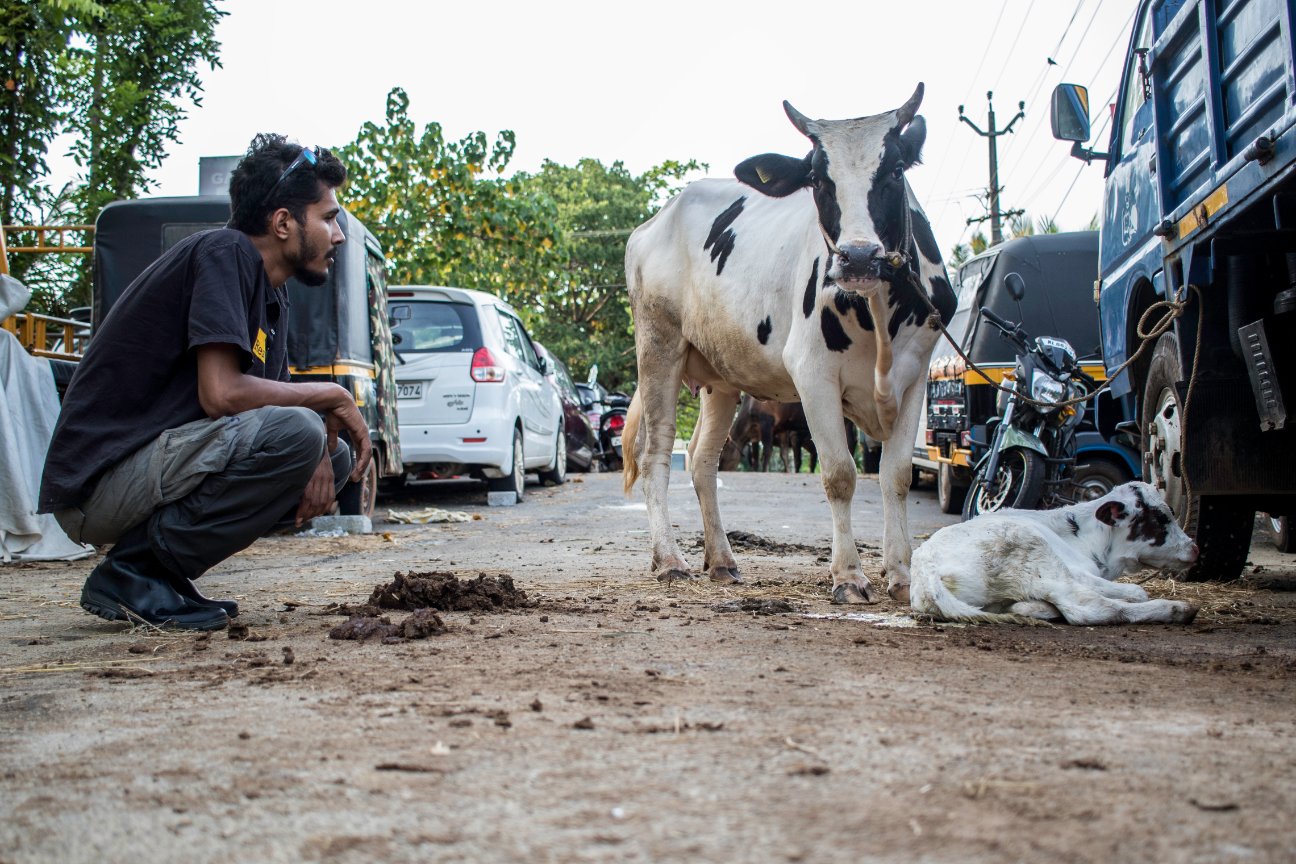
A relieved mother and calf: rescued, fed, and waiting for transport to a shelter.
We reported to Alappuzha Boat Jetty at 10:00 am the next morning. Not wanting to waste more opportunities to help starving and stranded animals, we loaded our boat generously with food and medicines. After sharing our gear and Medi-Kits with the other teams again, we headed out towards the regions of North Kainakary, Nedumudy and Kavalam, determined to help as many animals as we possibly could. We noticed that water levels had receded slightly, and areas were more accessible now than they had been on the previous day.
We found two dogs stranded in the water in North Kainakary, relocated them to dry land, and gave them food and water. Next, we found a cage full of starving, abandoned rabbits. We plucked banana leaves for them, and fed and reassured them. In a bittersweet moment, several neighbours came to us saying they wanted to help the rabbits and would care for them, which struck a chord considering the owners themselves had chosen to abandon the rabbits.
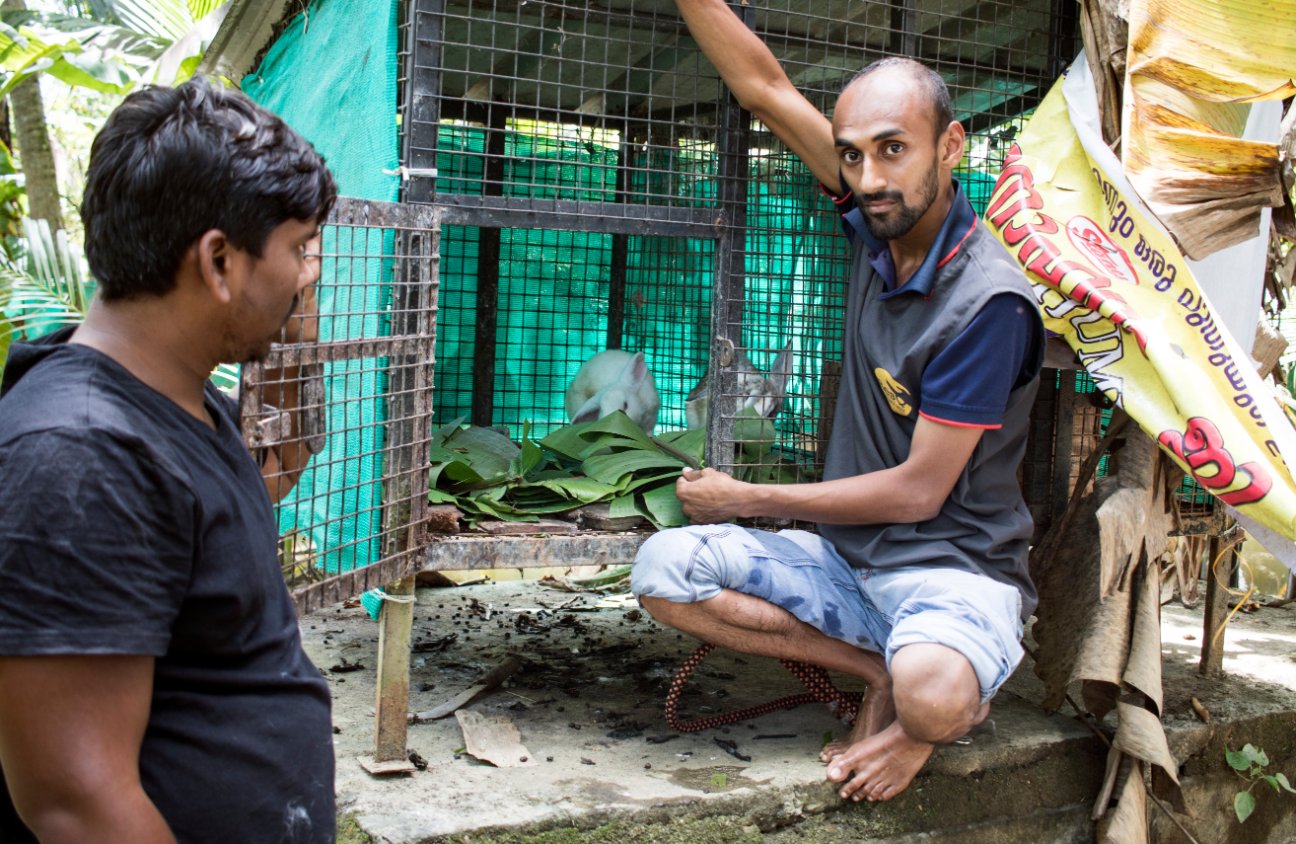
Abandoned by their owners, these rabbits would now be cared for by kind people in the area.
As we moved on, we rescued a frightened Labrador that had been tied to a small plank. Another dog, severely undernourished, had been stranded on a small patch of land with no access to food or water. We brought him to safety, and gave him food and water. Next, we found a pregnant dog doing her best to keep her little head above water, scratching frantically at a gate that had been submerged. Like several other animals through the day, we rescued her, brought her to higher ground, and gave large bags of dog food to neighbours that were taking care of her. Every time we brought a frightened, stranded animal to dry land, they would start jumping and licking us with gratitude, making every bruise, every sleepless night, and every missed meal all the more worth it.
The day was extremely productive, and we rescued several dogs, abandoned chickens, cows and birds, all of whom had been left stranded without access to food, wounded from falls, and sick from having ingested so much contaminated water. Sometimes, we would find distressed owners with weak or injured calves and goats, and we would stop to give them food and relieve them of their helplessness, and provide multivitamins and medication when necessary. We also saw quite a few heartbreaking cases of abandoned exotic birds whose wings had been clipped.
By now, it was 5:00 pm, and there wasn’t a molecule within us that wanted to stop. We forged on ahead to Champakulam port, where we were told there were abandoned birds, dogs and cows that needed help. It was getting dark quickly, and we switched on our head-lamps. Although we had gum boots on, the water here was much deeper than our boots, and was potentially snake-infested. We jumped in nonetheless, knowing the importance of our mission outweighed any personal risk. We waded through the water and found 8 cows, out of which two had sustained leg injuries, and one was ill from having consumed so much contaminated water. We waded on for 600 meters, treated the cows onsite at the village, and provided animal feed to the animals’ caretakers.
We split into two teams (one medical team and a rescue team) in order to coordinate our rescues more efficiently, and rescued and provided medical treatment to lovebirds that had been left stranded in a cage. Even though it was a relatively tall cage, water levels had been so high that four of the ten unfortunate lovebirds had drowned. One of them was critically ill and needed immediate medical attention, which we provided. Further ahead, we found an anguished calf that had fallen off a bridge, and was very weak. We gave him a multivitamin shot, and left him with a kind guardian.
When we returned to port, thanks to WTI’s connections, our rescued birds were taken to a vet specialising in Avian Practice for further care. As advised by the Animal Husbandry Department, goats and chickens (including the ones who had spent the previous night at the bungalow) were fostered at a human camp, and dogs were transported to the shelter in Ernakulam (near our Base Camp).
We stopped to finally grab some food on our way back to Base Camp, arrived at midnight, and fell asleep the moment we got to bed. Ever since we had left for Kerala, we were only eating two meals a day, and this combined with the exhausting physical and mental work involved in rescues and emergency medical treatment was finally taking its toll.
At 3:00 am that morning, we received an emergency call about an injured buffalo calf. We blinked back our sleep, summoned our strength, and rushed to the location. When we reached the buffalo, we saw that the poor animal was lying flat on the ground, semi-conscious, and bleeding from the nose and mouth. He had just survived a hit-and-run.
Three of his teeth had fallen out as a result of the accident, his jaw was fractured, and his right forelimb was dangling and broken. We got to work immediately, administered medical care, and loaded him onto our pickup truck. As there was no available place to take the buffalo to at the time, we took him back with us to Base Camp, where we knew we could monitor him through the night. A lot of the time, critical cases like these are often deemed ‘hopeless’ and ‘impossible’ to recover from, but we know that with the right medical care and attention, animals can bounce back from the most dreadful of injuries: all they need is a chance!
The following morning, we were out of food and medicines, and our car had broken down. We first found a Gaushala shelter for the buffalo calf and gave his new guardians the necessary medication for his care, after which we restocked on dog and cat food thanks to the kindness of the Million Animal Project. Because our vehicle had broken down, we couldn’t respond to emergency flood-relief cases and were forced to wait as our main vehicle was being repaired. We thus focused our efforts on attending to more accessible cases such as maggot wounds and accident cases within the city, and dropped off more food and medicines for local shelters.
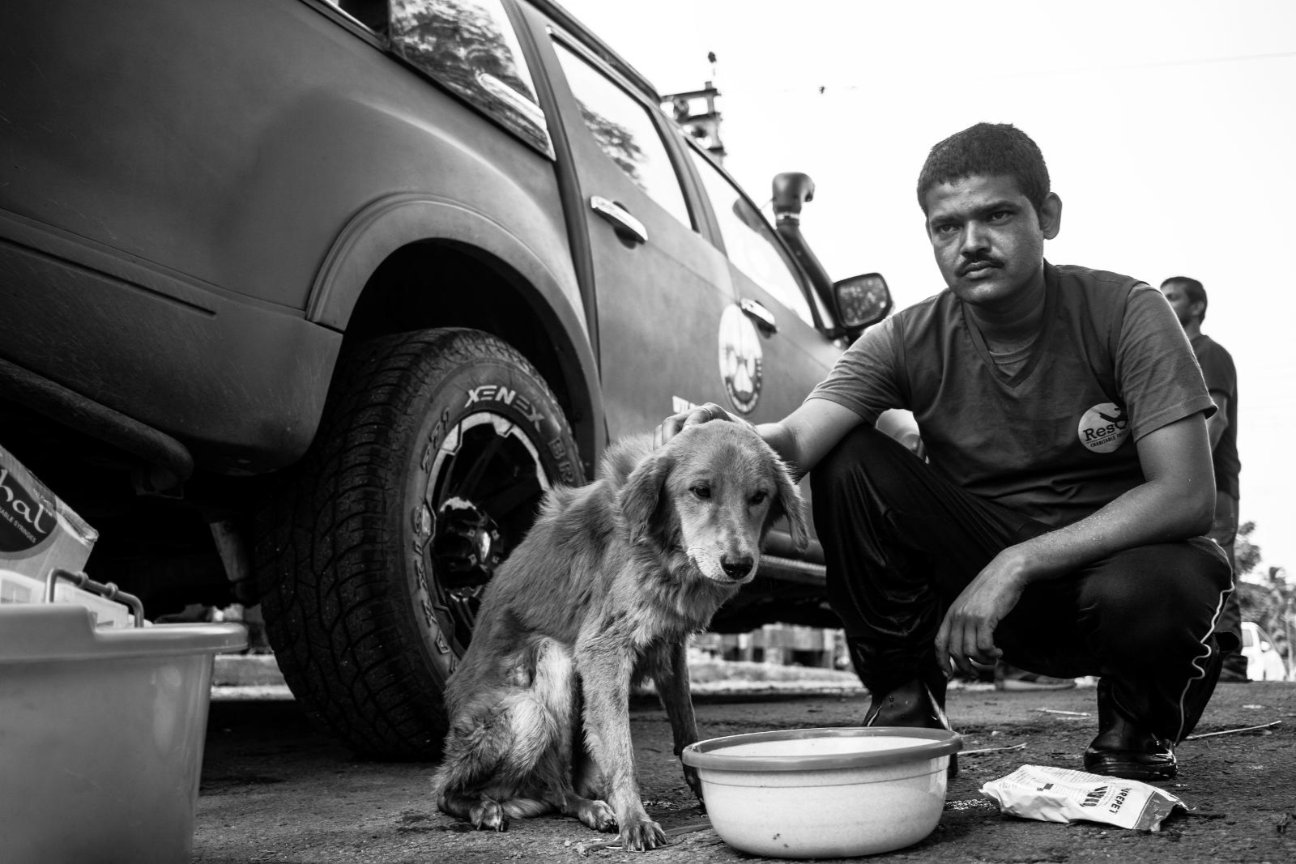
Exhausted from the day’s rescues, yet determined to keep going...
Bright and early the next morning, we received the day’s rescue requests, including about 50 cows. We went to the Boat Jetty, met with a local coordinator, and set off towards the 50 cattle who needed help. Members of the Wildlife Trust of India joined us and assisted us with rescues, and we were immensely grateful to have them sponsor our boat travel as well. By now, we had gotten used to traveling by boat, and were eager to help even more animals by joining forces with the WTI team. We saw that people were returning for their animals, and that neighbours were feeding those that had been abandoned. On the way, we helped feed and rescue several starving dogs and cows that were not on our list, including one poor cow that had severed her tail from trying to escape the water’s force. We also found an emaciated cat that was crying out for help, hiding in a rickshaw surrounded by water. Together with the WTI team's help, we rescued her, brought her to dry land, and gave her some food and water.
Finally, we headed deep into a village, at some points having to navigate WTI's truck through water. Whilst here, we found a lot of cows who didn’t have food as the village was cut off from resources and supply routes. As we unloaded food for the hungry cattle, we found that a distressed dog had been tied up and left in a dangerous position surrounded by water. We rushed to his aid immediately, and discovered that this dog, driven by unbearable hunger, had been attacking the village goats. Angry that their goats were being chased and attacked, the locals had grabbed the starving dog and tied him up, leaving him stranded on a wooden plank in the water.
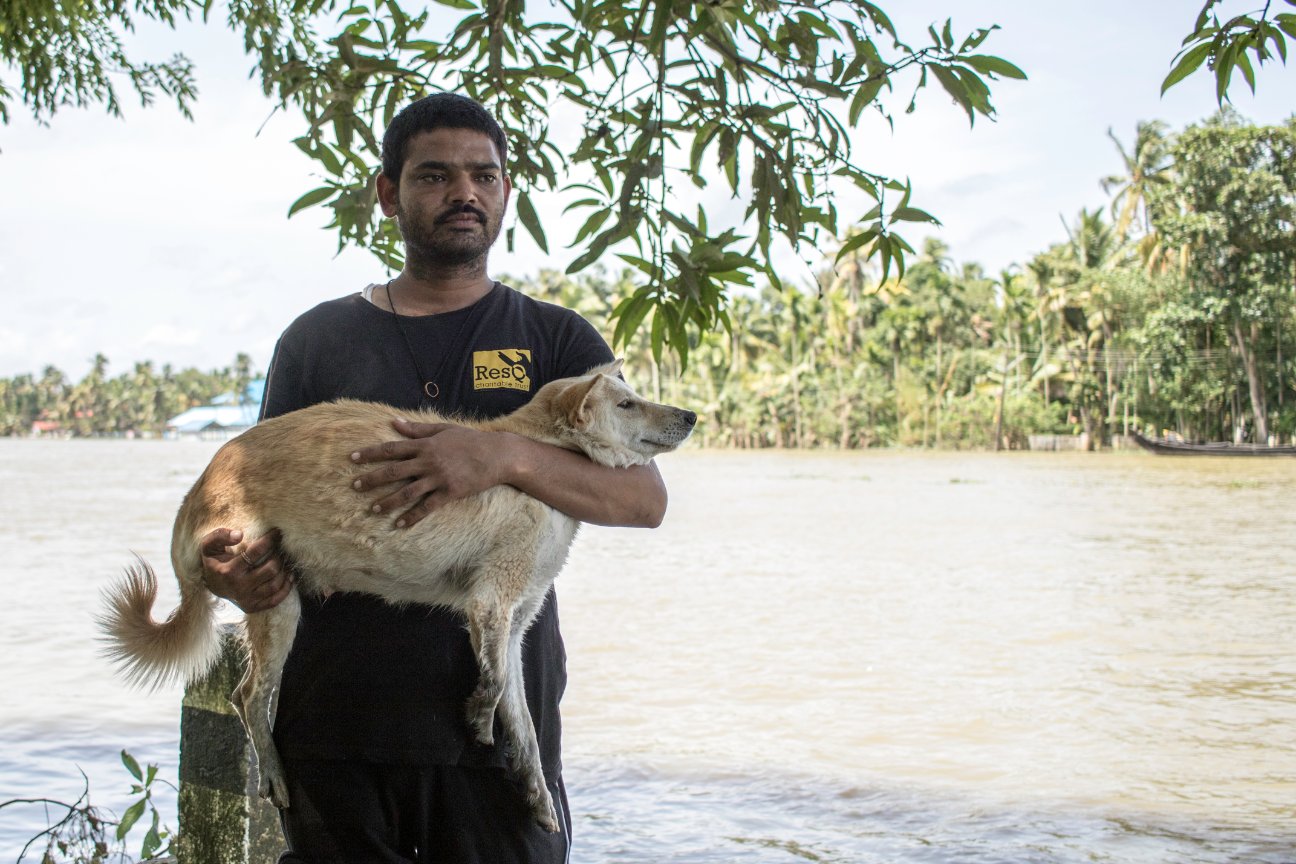
We rescued the dog and brought him to dry land, and explained to the locals that he was simply attacking out of hunger; that he wouldn’t bother the goats if the locals were to feed him. They were very receptive to this, and agreed that no animal should be left stranded in such a manner. Satisfied that the dog wouldn’t be harmed any more, we left food for dogs, cats and large animals with the villagers, and continued on.
Next, we arrived at a house that will always remain special to us, for its owner left us with a beautiful memory. This particular house was owned by a man that was looking after 7 stray dogs all by himself. It was a welcome change from the dozens of abandoned animals we had seen thus far, for here was a man that had taken in homeless dogs, wanting to help them all even though he was in danger, too! When we entered his home, the first thing he did was offer us payasam (pudding) and bananas, as it was Onam day (the Malayali harvest festival). Words alone cannot express just how touched we were. It was the first time during this exhausting journey that anyone had offered us food, and this was in the wake of a crisis that had cut the state off from precious food and supplies. We left with our bellies full and our hearts brimming with gratitude, smiling uncontrollably as this rare moment of compassion gave us the boost we so desperately needed.
We continued on in our mission, and found a 15-day old calf who was suffering with an infected umbilical cord. We provided emergency treatment and antibiotics, and helped the owner tend to his other cows as he was caring for approximately 16 cows at a time. We gave him a lot of food and instructions on how to care for the calf, and provided details on whom to contact should his animals need any more help.
Finally, we reached the 50 cows: all hungry, scared animals who needed urgent medical assistance. Some of them were injured, and one had a skin infection. We unloaded all of our cattle food here and spoke to the caretaker about how best to care for them. It was a rewarding experience to be able to speak to people who refused to abandon their animals, no matter how large or small, and care enough to get the injured ones the medical help they needed.
We then headed back to the Boat Jetty, and handed our remaining dog food and medicines to local shelters. On the way back to Base Camp, we helped rescue an abandoned Indie dog who had sustained a fracture. We transported him to a shelter, ensured he was well taken care of, and finally got ourselves some much-needed rest.
We left Kerala early the next morning, our minds swimming with the knowledge that this beautiful, flood-ravaged state needed far more than a small RESQ team: with so many shelters now decimated by Nature, Kerala needs the country to come together and help rebuild its facilities now more than ever, so that its animals can be protected and offered the right kind of medical assistance should disaster ever strike again. It was clear that there is no single state-wide entity that is running for the benefit of animals here, as most facilities have either been destroyed or never existed in the first place.
It was so frustrating for us to be on-ground and not be able to help as much as we would have liked to, which is why we spent a considerable amount of our time whilst in Kerala to build a network of reliable rescuers and animal welfare workers (such as the immensely dedicated Chennai Rescue Team) who will support us in our mission to rebuild the state: one that will work towards the welfare of all animals. With this network and the support of contributors from all over the world, we were able to rebuild Kerala’s only Animal Rescue Shelter Organisation -- PAWS Thrissur -- and I am so happy to say that thanks to this and the efforts of so many dedicated rescuers and supporters, should disaster ever strike again, Kerala’s animals will never be left behind like this again!
If you’d like to know more about our journey, you can watch a video documenting our Kerala flood relief efforts here: